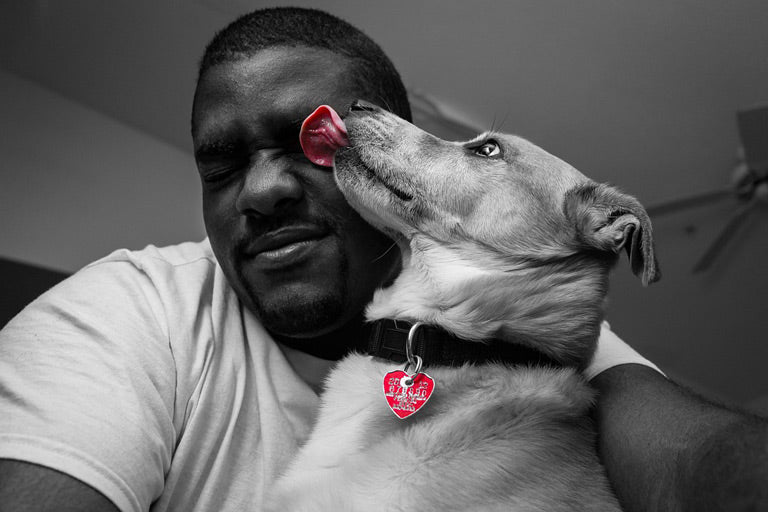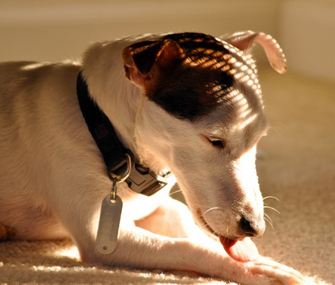
Benefits Of Dogs Licking Their Wounds Thanks to all the antimicrobial and healing properties weve looked at your dogs saliva can actually benefit wound healing to a certain degree. Studies in rats and mice showed that wound contraction and healing happen more quickly in rats with normal salivary glands compared to rats that can no longer produce saliva 9.

Licking is not a substitute for appropriate wound.
Is it good to let a dog lick their wounds. Benefits Of Dogs Licking Their Wounds Thanks to all the antimicrobial and healing properties weve looked at your dogs saliva can actually benefit wound healing to a certain degree. Studies in rats and mice showed that wound contraction and healing happen more quickly in rats with normal salivary glands compared to rats that can no longer produce saliva 9. A wounded dog might lick their injury to soothe the pain and cool the inflammation clean the area and potentially simply because it is hurting irritating or bothering them.
Licking and grooming in this way can also serve as a soothing mechanism for dogs too to help to calm them down and feel less unsettled or sorry for themselves. Can licking help wound healing. In fact theres some evidence that cross-species licking is related to lower levels of infection than same-species licking presumably due to the lower levels of species-specific bacteria.
But excessive licking and biting at a wound is NOT a good thing. And surgical incisions are not the appropriate indication for such ministrations anyway not when there are other better options. Just as humans rub their head after knocking it dogs will lick because the physical action helps to block the feeling of pain and releases a mild dose of feel-good serotonin.
Dog saliva also contains anti-bacterial properties and tissue factor. The former of which will help clean the wound and the latter will encourage blood clotting setting them on the path to healing. This video tells us about the natural response of why animals like to lick their wounds.
I think the best course of action is to use the same judgement that you would when dealing with a child. If the wound is small and fresh an everyday sort of wound that you know how they came by that is neither deep nor long the kind that will o. Veterinary care may include anesthesia debridement the surgical removal of foreign material and dead tissue from a wound thoroughly flushing and cleaning the wound applying topical antiseptics andor antibiotics suturing bandaging oral or injectable antibiotics and pain relief.
Wound licking does not have magical healing properties. Dogs and cats lick their injuries because they are uncomfortable. Licking is not a substitute for appropriate wound.
The discovery years ago that dog saliva had limited antibacterial properties has transformed into a myth that licking is good for wounds. Since then vets have battled to convince owners that licking is likely to harm wounds rather than help. Caroline Reay chief vet at the Blue Cross Merton animal hospital reveals some of the methods that can be used to limit a pets access to their.
MRSA infection in humans which produce lesions like the unsightly one above can be caused by as little as one lick from your dog. Dogs can carry around this bacteria with very little effect on their own health but when an owner comes into contact with it Yeah its a bad time. If your dog has an open wound whether from surgery or a recent accident it will want to lick the wound by instinct.
Unfortunately licking can reopen the wound and lead to infection. A good amount of licking can be helpful for small wounds. But remember discourage licking after surgery especially if there are stitches involved dogs are likely to bite and pull them out.
A case of too much licking causing skin damage. It isnt a good idea to let your dog lick your wounds and it really isnt a good idea to let him lick his own. Despite the suggestion that there may be bactericidal benefits the trauma caused by the friction of licking is destructive to the healing process.
Your best bet on a wound is to consult a veterinarian for your dog or physician for you. Medical assessment can tell you if the best bactericidal action will come from. Dogs cats rodents and primates all lick wounds.
There is a common folk belief that animal saliva especially that of dogs has healing properties for human wounds. It is common for us to see cat or dog licking their wounds. Not only animal human sometimes also have this kind of habit.
Unconsciously we bite or lick on our small wound especially those small wounds around the fingers. Well for some people licking wounds might be a nasty thing to do. It might also be assumed to be dangerous as it may increase the severity of the wounds.
As we know. Although your dog means well when it tries to lick your wounds canine saliva can cause infections in humans. As dog bites carry risk of infection so does licking.
It is rare for dog saliva to cause serious injury but it has in more than one case. Home remedies to prevent your dog from licking their wound. Techniques to deter your dog from licking their wound.
If your dog gets injured you want to make sure that its wound does not get further infected by cleaning out the wound thoroughly. The best ways to clean a wound These include antiseptics that are good for cleaning out minor wounds. The following home remedies are good.
Even if you have a strong immune system if a pet licks an open wound wash it with soap and water right away just to be safe and keep an eye out for any symptoms of infection.